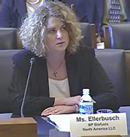 Leading industries in the race to commercialize next generation biofuels told a House agriculture subcommittee hearing on Thursday that more funding and stable government policy are needed to do the job.
Leading industries in the race to commercialize next generation biofuels told a House agriculture subcommittee hearing on Thursday that more funding and stable government policy are needed to do the job.
“The current financial crisis has prevented venture capitalists and bankers from investing in many worthwhile investments,” BP Biofuels North America president Susan Ellerbusch testified. “The industry and investors must see a secure market,” which she said, includes addressing the current 10 percent ethanol blend wall.
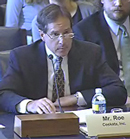 In addition to addressing the blend wall, Coskata president William Roe, whose company is pioneering low-cost production of ethanol from a variety of feedstocks, stressed the need for a consistent and inclusive biomass definition, as well as new or extended tax incentives. “Extend the cellulosic producer tax credit,” he suggested. “This expires in January of 2012 and consequently would provide little or no impact to even the earliest industry movers.” He also recommended flexibility in the monetization of biofuels tax credits.
In addition to addressing the blend wall, Coskata president William Roe, whose company is pioneering low-cost production of ethanol from a variety of feedstocks, stressed the need for a consistent and inclusive biomass definition, as well as new or extended tax incentives. “Extend the cellulosic producer tax credit,” he suggested. “This expires in January of 2012 and consequently would provide little or no impact to even the earliest industry movers.” He also recommended flexibility in the monetization of biofuels tax credits.
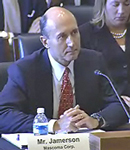 Bruce Jamerson with Mascoma talked about shortcomings in the USDA loan guarantee program that should be addressed. “For example, as the project size increases, the loan guarantee amount reduces which discourages larger projects,” Jamerson said. His company found that the vast majority of commercial lenders are unwilling to work with the loan guarantee program because of its requirements.
Bruce Jamerson with Mascoma talked about shortcomings in the USDA loan guarantee program that should be addressed. “For example, as the project size increases, the loan guarantee amount reduces which discourages larger projects,” Jamerson said. His company found that the vast majority of commercial lenders are unwilling to work with the loan guarantee program because of its requirements.
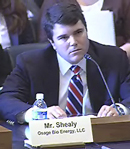 The president of Osage Bio Energy, Craig Shealy, told the panel that existing federal loan guarantee programs are “either too restrictive or too structured around specifically technologies, excluding commercial scale biorefineries from eligibility.” He recommended revising those programs, as well as taking other policy steps, such as increasing the ethanol blend level to 15 percent and simplifying the RFS2.
The president of Osage Bio Energy, Craig Shealy, told the panel that existing federal loan guarantee programs are “either too restrictive or too structured around specifically technologies, excluding commercial scale biorefineries from eligibility.” He recommended revising those programs, as well as taking other policy steps, such as increasing the ethanol blend level to 15 percent and simplifying the RFS2.
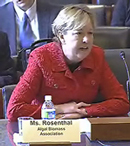 Also testifying on the panel was Mary Rosenthal with the Algal Biomass Association, who called for greater recognition of the potential for algae-based fuels. “Algae should receive the same tax incentives, subsidies and other financial benefits allowed to other renewable fuels such as cellulosic ethanol,” she said.
Also testifying on the panel was Mary Rosenthal with the Algal Biomass Association, who called for greater recognition of the potential for algae-based fuels. “Algae should receive the same tax incentives, subsidies and other financial benefits allowed to other renewable fuels such as cellulosic ethanol,” she said.
Opening statements from all panelists are available on the House Agriculture Committee website.

